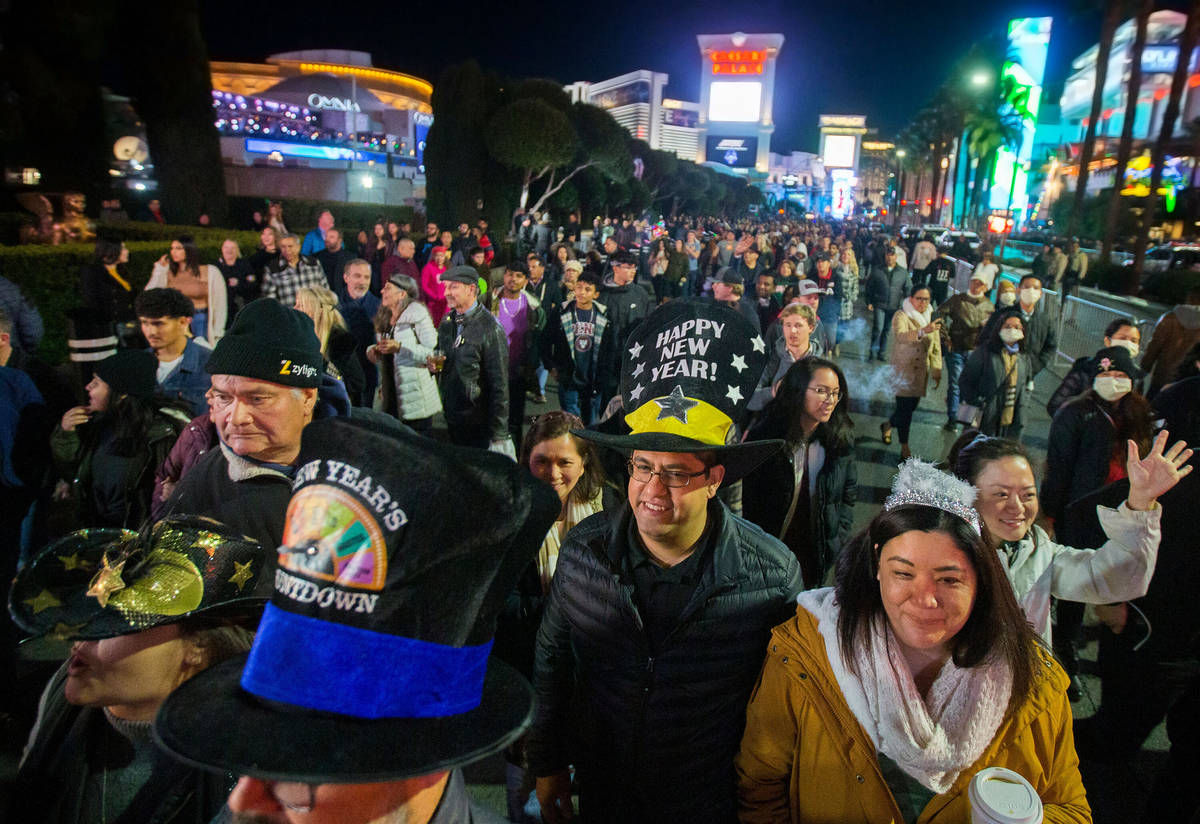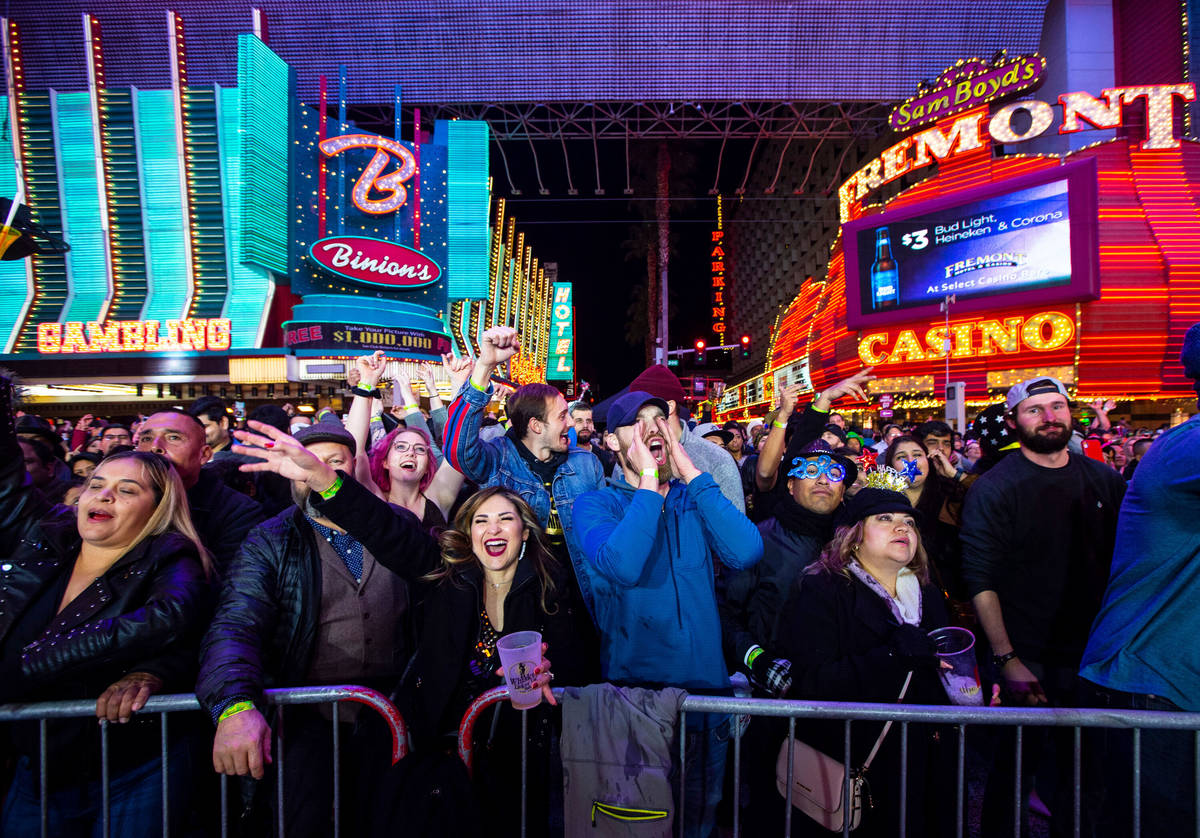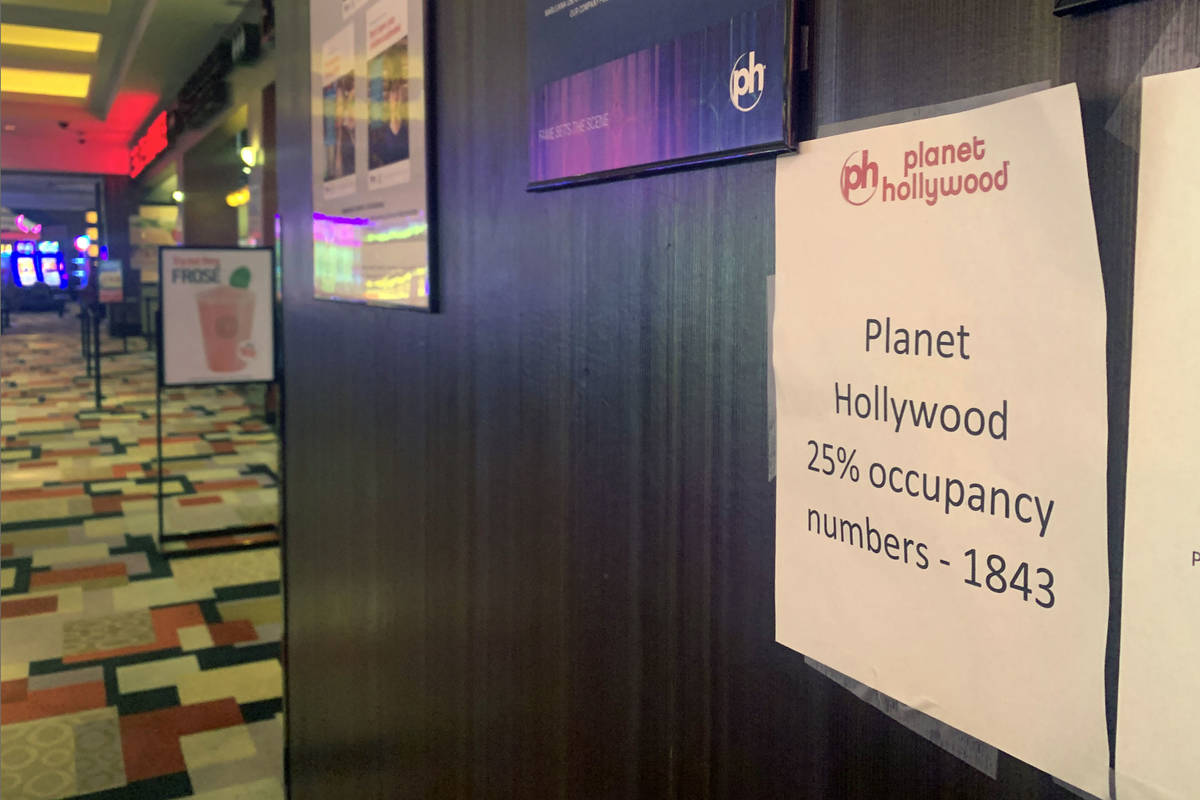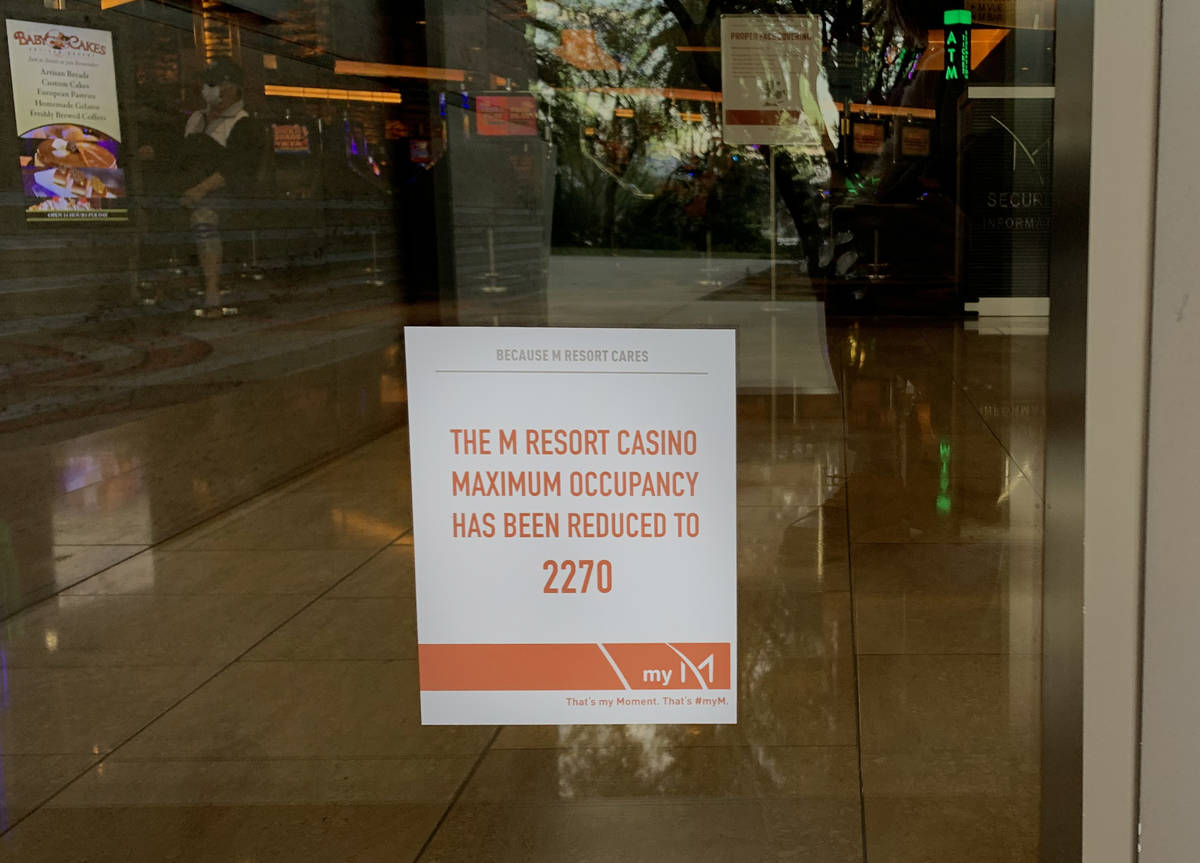Las Vegas is open for New Year’s Eve. Will COVID restrictions protect us?
A typical New Year’s Eve in Las Vegas could be a textbook case on what not to do during a pandemic.
Last year, more than 300,000 visitors packed downtown Las Vegas and the Strip for hours in shoulder-to-shoulder crowds, officials estimated. While COVID-19 should greatly reduce those numbers, the question remains whether the state’s current mitigation measures will allow people to safely celebrate outside of their homes.
“The answer, sadly, is no,” said Dr. Amber D’Souza, an epidemiology professor at the Johns Hopkins Bloomberg School of Public Health. “No one right now should be doing nonessential travel, interstate, to get together in a large group. That is one of the riskiest things you can do.”
Nevada is consistently adding new cases at a rate doubling its summer peak. As of Dec. 10, hospitals were treating more COVID-19 patients per capita than those in any other state.
But Nevada Gov. Steve Sisolak and local tourism officials maintain Las Vegas is open and safe to enjoy.
“Is it for everyone right now? No, but it is available for those who do want to travel,” Las Vegas Convention and Visitors Authority spokeswoman Lori Nelson-Kraft said. “I believe people are still coming here to celebrate, but they’re going to celebrate in a much more intimate fashion.”
Sisolak on Dec. 13 announced he is extending a “statewide pause” until Jan. 15 that restricts business capacity and gathering sizes to their lowest point in months. He said that if residents and tourists follow those rules “everybody can be safe.” He added that people who don’t want to follow them “should probably stay home” this holiday season.
“We are in a unique position in Nevada. We are reliant on one industry, our hospitality and tourism industry,” he said. “Our economy is basically reliant on hospitality and people coming here to have a good time and enjoy themselves.”
As Nevadans, we can each can do our part to keep our State safe. I implore you to help your fellow Nevadans stay safe by avoiding large gatherings, maintaining social distance and staying home when you can.
— Governor Sisolak (@GovSisolak) December 11, 2020
Public health officials have also avoided telling visitors to stay home, but this week they encouraged tourists and residents alike to carefully weigh what risks they take while celebrating.
“The trend is so high in our nation, you just need to assume that the people within the proximity around you are positive,” Nevada Department of Health and Human Services deputy administrator Julia Peek said.
State and local regulatory agencies report they are planning to conduct compliance checks New Year’s Eve to ensure businesses are following state-mandated COVID-19 protocols.
The fact that local hotel-casinos, bars and restaurants remain open — even at 25 percent capacity — as COVID-19 cases, hospitalizations and deaths reach new heights illustrates the challenges the state’s tourism-driven economy has faced during the pandemic. Official estimates put New Year’s Eve spending at $266 million in Las Vegas last year.
“You’re walking on the edge of a knife trying to balance the economy and at the same time a health care system that is being burdened heavily,” Sisolak said this month.
New Year’s Eve cancellations
It’s already certain that New Year’s Eve will look remarkably different this year.
Two major events are canceled: the Strip’s midnight fireworks show and the Fremont Street Experience’s annual party downtown.
Nightclubs have been closed for months. Restaurants can’t seat more than four people to a table. Public events with more than 50 people in attendance are forbidden, and private gatherings are limited to 10 people from no more than two households.
Local government officials say COVID-19 has changed business as usual to the point that it’s impossible to estimate how many tourists will actually show up this year.
However, it’s entirely possible the long holiday weekend could draw half the number of tourists who came last year, UNLV economist Stephen Miller said. He based his prediction on LVCVA tourism data showing the number of visitors in September and October was about half of what it was during the same months in 2019.
While it won’t feature its usual live concerts, the casino-dotted Fremont Street Experience is still set to be open. Like previous years, the Strip is set to be shut down to traffic, allowing pedestrians to freely mingle between properties. Unlike the businesses lining them, neither street has a capacity limit.
“There will be people here. They’ll be having fun, and they’ll be congregating,” Miller said. “Whether they wear masks is another issue.”
The elevated risk of disease transmission poses a threat not only to Las Vegas, but to visitors’ home states.
After almost a half-million people attended the Sturgis Motorcycle Rally in South Dakota this August, The Associated Press confirmed that hundreds of attendees had tested positive in a dozen states. The event may have led to more than 260,000 new cases nationwide, according to a controversial study from San Diego State University’s Center for Health Economics & Policy Studies.
Unlike South Dakota, Nevada has mandated mask wearing and other rules to curb disease spread. However, Johns Hopkins’ D’Souza said the most basic risk — people coming into close contact — cannot be eliminated on a busy night like New Year’s Eve.
She added that people choosing to travel during the height of the nation’s COVID-19 outbreak are likely risk-takers who will also discount the importance of social distancing and other mitigation measures.
“There absolutely are national consequences to these large events where people fly in from across the country, and mingle in large groups, and then leave,” she said. “Infection will come into Nevada that wasn’t there, and will also leave Las Vegas and go out to other parts of the country.”
High-risk environments
Common spots to celebrate New Year’s Eve, indoor bars and restaurants, are high-risk environments for COVID-19 spread, state biostatistician Kyra Morgan told Nevada’s COVID-19 task force Thursday.
“Any setting where there’s an opportunity for people to be unmasked, there’s a higher chance for disease transmission,” she said.
Restaurants and bars, along with casinos, are among the top industries receiving COVID-19 workplace safety complaints, state OSHA officials reported Thursday.
Strip resorts also repeatedly topped lists of businesses that infected Las Vegas residents said they visited before testing positive this summer. However, gaming companies attributed the results to robust employee testing programs. State government officials stopped compiling the data months ago, stating it pointed to businesses with the most employees and foot traffic.
Nevada Resort Association president Virginia Valentine said visitors should feel “very confident” they can safely celebrate in hotel-casinos that have spent months operating under the state’s COVID-19 safety measures.
The Wynn, for example, is limiting its New Year’s Eve parties to special restaurant dining events for hotel guests, company spokeswoman Deanna Pettit-Irestone wrote in an email. Valentine said she could see how other properties may opt to create more intimate experiences centered around guests.
“That’s a good way to create something that could be fun and exciting, and comply with all the (state-mandated) requirements,” she said.
The hotel-casinos that choose to remain open to the public on New Year’s Eve will be prepared to adhere to whatever capacity restrictions are in place, she said.
On Thursday, employees at various Strip properties could be seen screening customers’ temperatures before they entered gaming floors. At some, security guards patrolled floors with hand-held clickers, tallying how many people were inside. Valentine said resorts also have high-tech surveillance systems to make sure they aren’t over their reduced-capacity limits.
“We have created a very safe environment, and I think that visitors can be assured that their safety is our top priority,” she said. “New Year’s is a special time, but the health and safety requirements are the same for us every day.”
Contact Michael Scott Davidson at sdavidson@reviewjournal.com or 702-477-3861. Follow @davidsonlvrj on Twitter.
Review-Journal staff writer Mya Constantino contributed to this report.





















